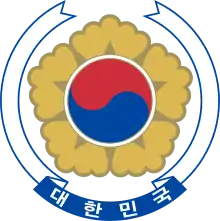Lee Hae-chan
Lee Hae-chan (born 10 July 1952) is a South Korean politician who served as Leader of the Democratic Party of Korea from 2018 to 2020. He also served as Prime Minister of South Korea from 2004 to 2006. [1] He is currently serving in his seventh term in the National Assembly.
Lee Hae-chan | |
|---|---|
이해찬 | |
.jpg.webp) | |
| Leader of the Democratic Party | |
| In office 25 August 2018 – 29 August 2020 | |
| Preceded by | Choo Mi-ae |
| Succeeded by | Lee Nak-yeon |
| 32nd Prime Minister of South Korea | |
| In office 30 June 2004 – 15 March 2006 | |
| President | Roh Moo-hyun |
| Preceded by | Goh Kun |
| Succeeded by | Han Myeong-sook |
| Member of the National Assembly | |
| In office 30 May 2012 – 29 May 2020 | |
| Succeeded by | Constituency established |
| Constituency | Sejong |
| In office 30 May 1996 – 29 May 2008 | |
| Preceded by | Lee Hae-chan |
| Succeeded by | Kim Hui-chul |
| Constituency | Gwanak B (Seoul) |
| In office 30 May 1988 – 30 June 1995 | |
| Preceded by | Yim Churl-soon, Kim Soo-han |
| Succeeded by | Lee Hae-chan |
| Constituency | Gwanak B (Seoul) |
| Minister of Education | |
| In office 3 March 1998 – 24 May 1999 | |
| President | Kim Dae-jung |
| Preceded by | Lee Myung-hyun |
| Succeeded by | Kim Duk-choong |
| Personal details | |
| Born | 10 July 1952 Jangpyeong, South Chungcheong, South Korea |
| Political party | Democratic |
| Alma mater | Seoul National University |
| Website | www.hopechan.kr |
| Korean name | |
| Hangul | |
|---|---|
| Hanja | |
| Revised Romanization | I Haechan |
| McCune–Reischauer | I Haech'an |
He served as Member of the National Assembly for the Gwanak District from 1988 to 1995 and 1996 to 2008. He served as Minister of Education under President Kim Dae-jung from 1998 to 1999. He presided over controversial education reforms including revamping the college entrance process and lowering the retirement age of teachers. He later served under President Roh Moo-hyun as Prime Minister of South Korea from June 2004 to March 2006.
On 27 August 2018, he was elected the leader of the Democratic Party of Korea.
Political career
Minister for Education
Hae-chan instituted reforms to the college admissions process. At the time was summed up in the slogan that being good at one thing was enough to get into college, was criticised for allegedly lowering dramatically the scholastic competence of the so-called "Lee Hae-chan generation" of then-high school students.
Prime Minister of South Korea
He was nominated by President Roh Moo-hyun to become Prime Minister of South Korea on 8 June 2004, confirmed by the National Assembly on 29 June, and took office on 30 June.
His nomination as prime minister met some resistance due to his record as minister of education, which many consider a failure. Since taking office, however, Lee has proved an able prime minister, being described by some as the most powerful prime minister South Korea has seen.
Golf-game scandal
On 1 March 2006, the Korean Railroad Workers Union and Seoul Subway Union entered a strike together. The strike of railroad and subway at the same time proved to be a fatal blow at the nation's economic activity, especially Seoul area, where traffic heavily depend on subway, which is controlled by these two unions. Prime Minister Lee was supposed to command the situation and mediate the strike; however, he was playing golf at Busan area with local businessmen, and this caused massive distaste among Korean people against Lee for not taking care of the government and people.
See also
References
- "Archived copy" 이해찬 (in Korean). Nate people. Archived from the original on 22 February 2012. Retrieved 22 January 2010.CS1 maint: archived copy as title (link)
| National Assembly of the Republic of Korea | ||
|---|---|---|
| Preceded by Yim Churl-soon Kim Soo-han as Members of the Assembly for Gwanak-gu |
Member of the Assembly for Gwanak B 1988–2008 |
Succeeded by Kim Hui-chul |
| New constituency | Member of the Assembly for Sejong 2012–2020 |
Incumbent |
| Political offices | ||
| Preceded by Goh Kun |
Prime Minister of South Korea 2004–2006 |
Succeeded by Han Myung-Sook |


